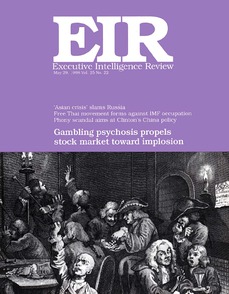Interviews
Msgr. Orlando B. Quevedo
Monsignor Quevedo, OMI, is the Archbishop of Nueva Segovia, the Philippines.
Departments
Australia Dossier
by Robert Barwick
Free trade slashes agriculture.
Report from Bonn
by Rainer Apel
Reviving a lost spirit of cooperation.
Editorial
It’s the IMF that’s to blame.
Documentation
The global financial crisis unfolds, 1944-98
by Jonathan Tennenbaum
Part two of last week’s Feature, “Financial Crisis: The End-Phase of a 30-Year Disease.” In part one, Jonathan Tennenbaum analyzed the origins of the present crisis, which involve the entire financial and economic history of the post-World War II period. Here, in chronological order, he outlines the most important points in that process, which have brought us to the point where failure to organize a “New Bretton Woods” system will condemn the world to a new Dark Age.
Why financial bubbles must collapse
Economics
‘Asian crisis’ slams Russia, as labor unrest spreads
by Rachel Douglas
The Russian Central Bank has raised interest rates to as high as 50%, in a desperate effort to attract investors and avert the bankruptcy of the state.
How IMF methods destroyed Indonesia
by William Engdahl
EIR has obtained a copy of the IMF’s April 13 agreement with Indonesia, which proves that, contrary to IMF official claims, the Suharto government’s decision to remove state subsidies, which led to rioting, was dictated by the IMF itself.
IMF: ‘Bankers are dangerous people!’
An official from the Fund becomes more than slightly unhinged, when queried about who is to blame for the political explosion in Indonesia.
A new ‘Free Thai’ movement forms against IMF occupation
by Michael O. Billington
LaRouche offers a strategic perspective for Thailand
by Lyndon H. LaRouche, Jr.
A worldwide chorus of attacks on the IMF
Business Briefs
Feature
Gambling psychosis propels stock market toward implosion
by Richard Freeman
Americans have engaged in an orgy of stock market investment, believing that each and every one will become a millionaire, and brainwashing themselves that the market could never go down. But the U.S. stock market could not be supported at even one-third of its current level. And when it crashes, the suffering is going to be severe. A study by Richard Freeman, including: the extent of the bubble; the British rig the market; the leveraging and de-leveraging of the market; unprecedented American exposure.
International
End Museveni’s silent war in northern Uganda
by Linda de Hoyos
Ugandan President Museveni is allowing the war in the north to continue, taking no significant actions either to stop the rebel Lord’s Resistance Army or to make peace with them, because the genocide suits his own ambitions, and the geopolitical plans of his British backers.
Protected villages: no food, no security
An interview with a teacher from Agago County, Kitgum District, Uganda.
Asian Synod at the Vatican debates evangelization, debt renegotiation
by Liliana Celani
The Special Assembly of the Synod of Bishops for Asia called for renegotiation of the debts of developing nations.
A New Bretton Woods is the only solution
An interview with Msgr. Orlando B. Quevedo.
Rowland scam aimed at Mohammad Al Fayed
by Jeffrey Steinberg
Jordan’s King Hussein pardons opposition leader Laith Shubeilat
Now, the only chance for stability for the kingdom, will mean breaking with International Monetary Fund policies.
International Intelligence
National
Anti-China hysteria targets Clinton and his China policy
by Edward Spannaus and Marsha Freeman
The only country which would be hurt by a cutoff of U.S. high-technology exports to China, should the Congress succeed in imposing such a ban, would be the United States itself.
Support grows for McDade-Murtha ‘Citizens Protection Act of 1998’
As we go to press, there are now 137 co-sponsors of this bill designed to clean up abuses by the permanent bureaucracy in the Department of Justice.
Wieczorek: ‘Free trade is the enemy’
Ron Wieczorek, a LaRouche Democrat campaigning for the Democratic Party’s Congressional nomination in South Dakota, explains his policies in a radio interview.
Congressional Closeup
by Carl Osgood



